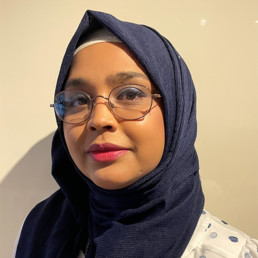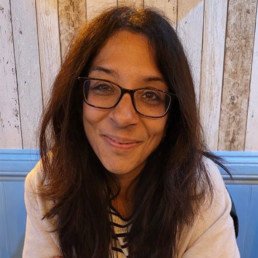From Silence to Story: How My Autistic Son Inspired a New Chapter in Inclusive Literacy

Written by Pamela Aculey
Pamela Aculey is an award-winning author, public speaker, and the founder of Just Like Me Books and MIXD Reality—the creators of the world’s first inclusive augmented reality picture book. Inspired by her autistic son Walter, Pamela is passionate about using storytelling and technology to create inclusive, interactive experiences that reflect the beautifully diverse ways children see and engage with the world. She is also a full-time carer and advocate for representation in education and beyond.
They say necessity is the mother of invention. But for me, motherhood itself sparked an invention that would not only change how my son reads, but how countless children see themselves in stories.
My journey with autism, storytelling, and technology began with my eldest son, Walter. A bright, beautiful mixed race boy who, in his early years, struggled to communicate verbally. Walter is autistic and was non-speaking until the age of 7. As a parent, nothing prepares you for the silence—especially when all you want is to hear your child say “Mummy.” But in that silence, I learned to listen differently. I began to see the world through Walter’s eyes: colourful, musical, expressive in ways that didn’t require words.
Books became a lifeline. But while reading to Walter, I noticed something glaringly absent—him. None of the characters looked like him. None moved, spoke, or communicated like him. Representation wasn’t just lacking; it was almost non-existent. I wasn’t just searching for stories; I was searching for mirrors.
And one day, in the silence, Walter showed me what connection could look like.
He had one particular book he returned to every single day. He’d scan the pages, then walk over and hand it to me—always open to the same page. He’d hum and flap the book gently in front of my face. I assumed he wanted me to read the story—again—for what felt like the tenth time that day. So, I would.
But then Walter would get upset. Irritated.
He’d snatch the book out of my hands and throw it to the floor.
And a few minutes later? He’d bring it back and start the whole process again.
I was confused. Frustrated. Heartbroken.
Until one day, I paused long enough to really look at the page he kept coming back to.
It was an image of a little boy drinking water.
Suddenly it hit me:
Walter wasn’t asking for a story.
He was trying to tell me he was thirsty.
That moment changed everything. My little boy, who didn’t use words, had found his own way to communicate. He didn’t need language—he needed connection.
That’s when the idea behind Just Like Me Books was born. I wanted to create stories that reflected children like Walter—not only in how they look, but in how they experience the world. Our debut title, Buster Finds His Beat, follows Buster, an autistic, music-loving mixed-heritage boy who communicates using beats, rhythm and music. Sound familiar? It should. Buster is inspired by Walter.
To bring the story to life in a way that resonated with children like him, I incorporated augmented reality (AR). I created an app where children can scan the pages and watch Buster dance, laugh, and play drums in 3D. For neurodivergent readers, this fusion of storytelling and sensory experience offers not only joy but accessibility.
Seeing themselves in stories is one thing. Interacting with them? That’s a whole new world.
This innovation became the foundation for MIXD Reality—a creative tech company I co-founded to explore how immersive technology can transform learning, reading, and communication. We now partner with educators, publishers, and brands to create AR-powered experiences across industries: from children’s books and emotional literacy tools to museums, healthcare, and financial literacy.
With nearly 1 in 7 people identifying as neurodivergent (NHS England), we need more than just good intentions—we need practical, inclusive resources. Traditional classroom tools often leave behind children who process the world differently. AR bridges this gap by turning passive reading into an interactive journey that supports diverse learning styles.
We are currently in the early stages of conducting our own research to explore how augmented reality can support autistic children aged 5–8. We are actively seeking partnerships with families and organisations to help us carry out this important work. If you would like to be part of this, please get in touch. Because innovation shouldn’t be reserved for the few—it should uplift the many.
I’ve watched Walter go from being non-speaking to now writing his own short stories—and talking all the time! He’s 11 now, and still beats on everything—tables, tubs, anything that makes a sound. But more importantly, he reads. Not because he has to, but because he wants to. And when he saw himself in Buster, he beamed.
That smile reminded me why I started this work in the first place.
We often talk about diversity and inclusion in terms of policy, but what about practice? Are our bookshelves inclusive? Are we designing content with all learning styles in mind? Are we creating mirrors and bridges?
My hope is that Just Like Me Books and MIXD Reality spark more questions, more conversations, and more creativity.
Because every child deserves to be the hero of their own story—and sometimes, all it takes is pausing long enough to really look at the page they’re holding.
How do you plan good lessons on homosexuality when resources only tell half the story? A call for proper representation in religious education textbooks

Written by Jonny Tridgell
Jonny began his career as a secondary school teacher in 2009 and has since been a head of sixth form, head of department and lead practitioner for EDI. He has also worked in teacher education as a mentor, curriculum tutor and general tutor on the University of Oxford PGCE. He completed his MSc in Education (Digital and Social Change) at Oxford in 2024. He is currently working as Equality, Diversity & Inclusion Data and Insights Officer at Jesus College, Oxford, alongside roles as a teacher, teacher educator and researcher.
Imagine you are planning a GCSE lesson on Christian beliefs about homosexuality, but you don’t feel confident about the topic. You might have a theology degree and a PGCE in religious education, but have never really studied queer theology, or maybe you are one of the many non-specialists delivering these lessons in the UK (Orchard, 2024). You’re not sure where to begin planning your lesson. Do you do a debate with the students? Perhaps you could do some textual study, but then which texts? You know that Christianity has often the basis for homophobia, but you also don’t want to suggest to your students that Christianity is prejudiced or bad. So, what do you do next?
You might look for shared resources made by a colleague or look online. You might use AI. One solution would be to use a textbook or revision guide endorsed by your exam board. Jackson et al (2010) found that many teachers used textbooks just for that and in my experience as an educator and researcher, many teachers (including me), still do. Textbooks are helpful for pitching, but also, geared as many are to exams, provide a great deal of reassurance. However, there is a risk to this, because RE textbooks in the UK tend to sanitise and essentialise Christian beliefs about homosexuality and to present these through a Eurocentric lens.
In a recent paper for The British Journal of RE (Tridgell, 2025), I found that textbooks represent Christian approaches to homosexuality in a way that has been sanitised, excising those churches that promote explicitly anti-LGBTQ+ views. These textbooks also generally excluded African Christianities and churches, portraying African Christians as recipients of aid or evangelism only, not as theologians. One reason for this might be a desire to promote community cohesion by only presenting socially acceptable or “positive” views of Christianity as real Christianity (see arguments made by Smith et al, 2018), even if this presents a view of Christianity that is false. The Eurocentric approach here is perhaps even more troubling, given the way this might exclude those whose experience of Christianity is not reflected in these textbooks.
As a gay RE teacher who studied Christian approaches to homosexuality, I can plan these lessons carefully and accurately, and I feel confident about balancing the need for academic integrity with keeping students (and myself) safe in the classroom. My years teaching about Christian attitudes to homosexuality have taught me hard lessons about framing; in my view, it is always best to treat this as a theology lesson, rather than an ethics one – that is, thoughtfully examining different Christian views across the breadth of the religion but never debating whether it is okay to be LGBTQ+ or if homophobia and transphobia are allowed. Importantly, I am not trying to criticise those who lack this confidence or this experience – I understand why someone might reach for a textbook to help plan this lesson – but I am critical of publishers who put out resources that fail to properly help with this planning. RE/RS teachers – especially those who have other specialisms – need proper support and guidance about what to teach and how to teach it. In short, RS/RE textbooks should:
- Include the full range of Christian views of homosexuality, including those that advocate for conversion therapy or other forms of anti-LGBTQ+ violence
- Include Christianities (both anti-LGBTQ+ churches and those that are affirming, along with those in between) from across the world, including Africa across all areas of Christian life.
- Recognise the inherent “messiness” of religion, and that belonging to a denomination does not mean someone’s personal beliefs necessarily fully align with its official teachings
- Frame lessons on LGBTQ+ people through theology rather than ethics; it is not safe to debate the existence of LGBTQ+ people nor is it reasonable to ask whether Christianity as a whole is homophobic; better to evaluate how a text is being used, for example, or ask why churches might have different views.
If you are the teacher I described, I would advocate caution and some reflection on whether the resource you are using really reflects the full story. If you are a textbook publisher or academic resource-maker, I hope this serves to call you in; community cohesion requires us to do epistemic justice (Fricker, 2003) to all those in our community – it is not served by pretending the world is not as it is. After all, how can we champion LGBTQ+ liberation and decolonisation if we only tell half the story?
Jonny’s article “Sanitised, essentialised and Eurocentric: an analysis of the (mis)representation of Christian beliefs about homosexuality and African Christianity in English RE textbooks” has been published Open Access here.
Championing Diversity Through Literature: Our Pioneering Journey with Lit in Colour

Written by Gemma Hathaway
EDI Trust Lead for Inspire Education Trust, Assistant Headteacher at Blue Coat School Coventry.
At Blue Coat School Coventry, our partnership with Penguin and Pearson through the Lit in Colour project has been transformational. It has reimagined how we engage with English literature, ensuring that the stories we teach truly reflect the diversity of the world our students live in.
As the EDI Trust Lead (Inspire Education Trust), I have been privileged to work alongside the English department in this pioneering project. It’s been about more than simply adding new books to the curriculum — it’s been about fostering a deeper, more authentic approach to inclusion. Through this project, we have embraced the belief that literature has the power to validate identities, open minds, and create communities rooted in understanding and empathy.
Choosing The Empress
As part of Lit in Colour, we made the bold decision to teach Tanika Gupta’s powerful book The Empress at GCSE. Set against the backdrop of British colonial history, the play explores the relationships between Queen Victoria, Abdul Karim, and Rani Das, a young ayah from India.
Choosing The Empress was a courageous move — it challenged traditional literary choices and brought forward voices that have too often been marginalised. As a school community, we knew this would be a bold step, but one that was absolutely necessary.
Shaped by Broader Conversations
Our journey has not happened in isolation. The work of organisations like Diverse Educators, Equaliteach, and the ASCL EDI sub-groups has played a huge part in supporting us to approach this work with authenticity and integrity. Through dialogue, training, and collaboration, we’ve deepened our understanding that genuine change requires courage, reflection, and a commitment to ongoing learning. We have proudly embraced the idea that it’s okay to feel uncomfortable at times — because that discomfort signals that something meaningful is shifting.
Recognition and Gratitude
It was an incredible honour when Pearson recognised Blue Coat School as a Bronze Winner in the ‘Making a Difference’ category of their national awards. This accolade celebrates schools that have gone above and beyond in driving positive change — and it felt like a powerful acknowledgement of the journey we have been on.
We are so grateful to Pearson, Penguin, and the Lit in Colour team for their partnership and encouragement. Their support has allowed us to be bold, to innovate, and to centre pupil voice in every aspect of decision making.
Looking Ahead
But this is only the beginning. We are excited about the ripple effect this work is already creating — not just within our own school, but across the wider education community.
We are currently working with Tanika Gupta to explore adapting The Empress for a live stage production, offering students an even richer, more immersive experience. It’s another way to bring these powerful stories to life, allowing young people to step into the characters’ shoes and truly understand their journeys.
In May, we will be attending a national celebration event in London, where schools from across the country will gather to continue raising the voices of authors who deserve a platform within our curriculums. We hope to encourage other Multi-Academy Trusts (MATs) and schools to review their English curriculums with bravery and vision — to be bold in asking: Whose stories are we telling? And whose voices are we still missing?
At Blue Coat, we believe that every student deserves to see themselves in the stories they study. Through projects like Lit in Colour, we are building a future where every voice matters — and where literature truly belongs to us all.
References:
Distorted Mirrors, Fogged Windows: A Call for Deeper Representation in Education

Written by Tamanna Abdul-Karim
Tamanna Abdul-Karim is Assistant Headteacher responsible for Literacy, Equality and Diversity in an inner city school in Birmingham. She has completed the NPQLL and Masters in Educational Leadership and Management /Level 7 Apprenticeship with the National College of Education. She is an English teacher at heart and her desire to create a sense of equality and justice motivates her. It is through education, she hopes to create impact and leave a meaningful legacy.
The concept of “mirrors, windows and sliding doors,” introduced by Dr. Rudine Sims Bishop, has become a foundational framework in conversations around diversity in children’s literature and multicultural education. In her metaphor, mirrors reflect readers’ own identities and lived experiences, windows offer insights into lives different from their own, and sliding doors allow readers to step into those other worlds, fostering deeper engagement and understanding.
This framework is not only relevant in literature — it has transformative potential across all aspects of school life. From curriculum design and cultural representation to enrichment opportunities and even staff recruitment, it offers a way to embed inclusion and equity into the very fabric of educational settings. When embraced authentically, it cultivates a culture where every student is seen, valued, and empowered.
However, if not approached thoughtfully, these mirrors and windows can distort reality. They can perpetuate stereotypes, invisibilise complexity, and contribute to feelings of alienation, shame, or disconnection — particularly for students from minoritised backgrounds.
A Personal Reflection: Distorted Mirrors, Fogged Windows
As a child of Bangladeshi heritage growing up in inner-city Birmingham in the 1990s, my school experience offered only two narratives about my country of origin: that it was poor and that it flooded. While these facts are not untrue, they painted a one-dimensional picture that deeply distorted both my self-image and my understanding of my heritage.
The mirror I was presented with reflected famine-stricken children, submerged villages, and chaotic streets. The window offered a view steeped in deficit — one that suggested my background was something to be downplayed, or even disowned. As a result, I internalised a sense of shame. I learned to code-switch early: Bengali at home, English at school. I adapted the way I spoke, behaved, even the way I ate — compartmentalising parts of my identity to belong.
What my schooling failed to reveal was a far richer, more complex history. I didn’t learn that before colonial rule, Bengal was one of the most prosperous regions in the world — a hub of culture, trade, and innovation. I wasn’t taught about the globally coveted Jamdani textiles, or that Dhaka was once one of the busiest ports on earth. There was no mention of how British colonial policies contributed to devastating famines, or how Bangladesh achieved independence through extraordinary resilience and sacrifice.
This erasure had consequences. It shaped how I saw myself — and how I believed others saw me. It taught me that some stories are celebrated, while others are sidelined.
Who Holds the Mirror? Who Builds the Frame?
This experience highlights a deeper issue: representation is not just about inclusion, but about how people, places, and histories are portrayed — and who gets to do the portraying.
We must ask: Who is holding up the mirror? Whose perspective shapes the window? What frames are we using to present narratives of identity, culture, and heritage?
It is not enough to simply provide visibility. We must examine the structures — the frames and lenses — through which these representations are filtered. If the frame itself is biased or incomplete, then the images it presents will be equally flawed.
A Call to Educators: From Representation to Reimagination
Educators carry immense responsibility. We are not only curators of knowledge — we are architects of perception. Every decision we make about curriculum, literature, resources, or enrichment shapes the mirrors and windows we offer to our students.
This work requires deep reflection. We must interrogate our own biases, challenge inherited narratives, and resist the temptation to present simplified or tokenistic views of cultures and communities. We need to move beyond surface-level inclusion to truly equitable representation.
This begins with unlearning — with a willingness to revisit what we’ve been taught, and to seek out the histories, voices, and perspectives that have long been marginalised.
Because when children see themselves reflected fully — in all their richness and complexity — they stand taller. And when they’re given a window into the full humanity of others, they grow kinder, more curious, and more connected.
Let us hold up better mirrors. Let us open clearer windows. Let us build sliding doors that do not just invite exploration, but also affirm belonging.
Decolonising the curriculum

Written by Shashi Knott
Shashi Knott is an English teacher and former Deputy Head of Sixth Form, with 16 years of experience teaching in state secondary schools across North London. After earning her MSc in Education, Power, and Change, she transitioned from her role as a full-time English teacher to focus on driving change within education. She is interested in working with other professionals to see how we can create more compassionate environments in schools. She is currently an outreach English teacher and Associate Trainer with KCA Training.
Decolonising the curriculum is like finding new love—it’s hard work, often requiring us to let go of what we’ve cherished. It’s a struggle, and one that calls for understanding and acknowledgment of the emotions involved.
The department meeting went silent. A chair scraped awkwardly as we shifted at tables. It was nearly 4.30pm. Everyone had marking to do. Was this about to get tricky?
In London, where I work as an English teacher, 46.2% of residents identify as non-white. It’s not a difficult context to make an argument that the texts we teach our students should be more representative. And yet, somehow, we don’t seem to make it happen.
We could absolutely have spent some of our fast- vanishing department budget on a new set of texts for Year 9. Amazingly, we all agreed that Elizabeth Acevedo’s ‘The Poet X’ would be an excellent choice for the spring term. However, when one of us asked, “What about George Orwell?” I know they were not the only ones thinking this. The silence in the room might have suggested otherwise, and we all knew what we should say next. So when our Head of Department was conciliatory, coming up with the comfort of delay, we were all secretly relieved. “We’ll revisit the discussion at the end of the term.” “ We’ll review again in our gained time.” “We’ll assess our existing schemes of work for diversity. ”
We know what we should be advocating for, but there are so many reasons why teaching ‘Animal Farm’ feels more comfortable, and it’s not just because we already have established schemes of work.
As English teachers and often English graduates, we have all internalised an idea of what constitutes the canon. Literary critic Harold Bloom describes canonical texts as works of ‘aesthetic beauty’ (1994) and therefore, he suggests, to question these texts is to question the merit of art itself. Bloom describes the ‘idealistic resenters’ who ‘denounce competition’ and want to focus on marginalised voices, as missing the point of art and culture. (1994) Whilst Bloom’s ideas have been convincingly challenged and are now certainly out of fashion, they are ideas that we cannot fail to have internalised. Many of us grew up with these views being the dominant narrative in the study of English Literature and speaking for myself, I did much work to embrace the canon. I certainly did not want to be seen as someone who missed the point of art.
We have to acknowledge that decolonising our minds is uncomfortable. It involves acknowledging that some of the texts we loved, we might need to let go. A bit like the way a song from our youth, however rubbish, will always evoke strong feelings, those first occasions of literary love will do the same. The first time you felt seen, grown up, clever, understood. That first moment of connection with the canon. Mine was Keats, the perfect poet for the
misunderstood teen. Decolonising the curriculum involves a deconstruction of the canon, of beloved texts, and that can mean a painful epistemic discomfort. We picked apart those texts. We invested meaning in them. We succeeded at them. That’s why we’re English teachers.
Decolonising the English curriculum is as much about interrogating our own relationship with literature as it is about buying new books or creating schemes of work. It is about being willing to forge new relationships with texts and giving our students those special moments of connection, potentially with texts that are not our one true love. It’s not just about representation for global majority students, it’s about a more inclusive literary canon for everyone.
Maybe as English teachers we need to go forth and find new literary loves. New characters to fall for. New writers to make students feel understood, and to voice, in new ways, all the age old feelings. Not a new canon. Just new names to add in. New, gritty, glittering, literary loves for students of English to come.
References
Bloom, H. (2014) The western canon: The books and school of the ages. New York: Houghton Mifflin Harcourt.
Why Every Child Deserves to Hear Their Own Song

Written by Matthew Dix
Matthew Dix is a primary school teacher of 17 years. He continues to work as a teacher whilst working as a primary reading consultant across Nottinghamshire. He is the Founder of resource website Manic Street Teachers and has recently launched 'Musician of the Month' to create a culture of musical appreciation and understanding across schools, with a focus on diversity and inclusion.
Growing up, music wasn’t just background noise – it was how I made sense of the world. It was my mum playing the piano, it was watching her dance to ABBA and playing, of all things, a mandolin! It was my dad blasting heavy metal one minute and Vivaldi the next. Nothing quite says ‘peaceful Sunday morning’ like Iron Maiden shaking the windows!
As I reached adolescence, my heroes ranged from Tupac Shakur to Freddie Mercury, from John Lennon to Annie Lennox. Following their lives taught me that struggles were universal and at the end of a struggle, there can still be success. Behind every composition, every lyric, every guitar solo was a person with a story – often one of resilience against all odds.
Music took centre stage when I formed an indie band in the early 2000s. It wrote songs, often with the children’s help, for primary school subjects when I began my career as a teacher. It was a focus of mine when I created the music resources for ‘Manic Street Teachers’. Music has always been in the foreground of whatever I do.
A decade ago, I took a job in an inner-city school in Nottingham with 98% of children having English as an additional language. In fact, there were 52 different languages spoken in total. And yet, the music curriculum offered very few mirrors of themselves or windows to other worlds. A colleague and I decided to introduce a new musician every month in the hope of engaging children who seemed vacant during singing assemblies, and often unable to discuss and share their likes and dislikes in music lessons.
It wasn’t until we chose Nusrat Fateh Ali Khan as a musician one month that parents started to leave emails, children started to talk and a buzz started to make its way through school. I remember a child telling me that their parents listened to him at home. We shared his life, his trials and tribulations, his achievements and videos of his performances. Children could explain his words and what they meant. They were fascinated to learn that he had come to England in 1985 and brought Qawwali music (a form of Sufi Islamic devotional singing originating in India) with him. Children finally saw themselves and their families in our curriculum.
👉 Free Sample (Nusrat Fateh Ali Khan) – sign in required
It got us thinking. What if a girl thought that she could never be a classical musician because she looked nothing like Mozart, Beethoven or Bach? Well, we created resources all about Florence Price, whose compositions were forgotten until, just 16 years ago, when a whole collection of her work was rediscovered in a dilapidated house on the outskirts of St. Anne, Illinois.
What about a child who believes music is impossible with a disability? We shared Stevie Wonder’s story, Jacqueline du Pré’s story, and we shared how Joni Mitchell had to detune her guitar to learn to play another way after polio affected her hand. Let’s show them how these artists found ways to keep playing, no matter what. The show must go on, as Freddie Mercury said!
We live in a global world – our music curriculum should reflect that. Instead of saying, “Let’s learn African drumming,” let’s say, “Let’s learn about Babatunde Olatunji, a Nigerian drummer who learned by immersing himself in the culture and following the master drummers in his village, eventually being given a cowbell and then various Yoruba drums, took his craft to America, became an important friend to Martin Luther King Jr., and became a world-wide sensation!”
If a child thinks you can’t play music when you’re old, then share the story of The Buena Vista Social Club – how Ry Cooder, a producer from the US, had a twist of fate when musicians from Mali had their visas delayed so he ended up in Cuba, reuniting forgotten musicians like Ibrahim Ferrer, who was still shining shoes to make ends meet. The musicians, most of whom were over 70 years old, finally had a chance to tour the world with their music.
👉 Read our EYFS eBook (Ibrahim’s Song)
Context is always king, and every child loves a story. I believe the person behind the music is as important as the music itself, and becomes the bridge to another world. Teaching children to empathise helps them feel less detached from the music they are studying. Music bridges cultures, generations, and experiences in ways that words alone sometimes cannot.
That’s why I created Musician of the Month – a simple, accessible way for teachers to bring diverse musical stories into their classrooms. It’s directly linked to The Model Music Curriculum and the 9 Protected Characteristics and, as the site develops, we hope it will help schools show every child that they too can be a musician. To a child in school, the right musician, with the right song, at the right moment could well hit the right notes!
👉 Musician of the Month + Free Sample (David Bowie)
World Book Day 2025

Written by Robert Davies
Rob Davies is Associate Assistant Headteacher at Calderstones School in Liverpool. This role involves leading on anti-racism in education, sharing practical strategies, reflections, and initiatives to create a more inclusive, representative, and equitable school. He shares insights on decolonising the curriculum, diversifying reading materials, and fostering anti-racist practices in schools.
Another year, another World Book Day—same costumes, same characters. Harry and Hermione? Check. Little Red Riding Hood? Of course. The Gruffalo? Naturally. And let’s not forget Mrs. Trunchbull, stomping through the halls. Sound familiar? Thought so.
But here’s the thing—World Book Day can be so much more. It’s time to move beyond the usual suspects and reimagine it through a truly diverse lens. Let’s make it an event where every student sees themselves in the stories we celebrate.
Every year, World Book Day celebrates the magic of stories. But whose stories are we telling? Who do they inspire? When books and characters overwhelmingly reflect white, middle-class experiences, whose voices are missing? Are we selecting a diverse range of books that offer all children equitable opportunities to see themselves?
If not, isn’t it just Book Day?
At its core, World Book Day aims to “promote reading for pleasure, offering every child and young person the opportunity to have a book of their own.” But if we fail to approach it through an anti-racist lens, are we truly serving all students?
The Representation Gap in Children’s Books
In the UK, 33.5% of school-aged children come from ethnic minority backgrounds. Yet, between 2017 and 2019, only 7% of children’s books featured characters from these cultures—and just 5% had a Black, Asian, or Minority Ethnic main character.
Research shows that when children see themselves in books, it shapes their sense of identity and possibility.
Despite limited representation, excellent books exist that help students feel seen, foster belonging, and cultivate a love of reading. But do schools actively seek them out?
The issue goes beyond just introducing diverse books. What if teachers haven’t read them, or don’t understand their significance?
Whose culture has capital?
With a predominantly white teaching workforce (Runnymede Trust, 2020), how often is World Book Day shaped through an anti-racist lens? One of the biggest motivators for reading is emotion—how books make us feel (Dungworth et al., 2004). Naturally, educators promote books that resonated with them in childhood, shaped by their own experiences.
If most books being championed reflect the same narrow cultural perspectives, what message does that send? Who do these books inspire—and who gets left out?
Research further supports this. More children from ethnic minority backgrounds than white backgrounds say they don’t see themselves in what they read (40% vs. 30.5%), with Black students feeling this most acutely.
Making It a World Book Day
If World Book Day is to truly reflect all students, schools must take active steps to make it more inclusive. That’s exactly what we did at Calderstones School this year.
As one of Liverpool’s largest secondary comprehensive schools, diversity is our strength. But we recognised that World Book Day needed to reflect that diversity, ensuring all students felt represented and engaged.
So, we embraced the ‘world’ in World Book Day. We focused on books and authors from a variety of cultures and languages, fostering conversations about students’ mother tongues and cultural backgrounds.
We collaborated with Greenbank Primary School and Leeds Beckett University to involve primary school students and Global Ambassadors. Together, they read books from their home countries in their native languages—including Arabic, Basque, Farsi, French, Greek, Mandarin, Polish, Russian, Urdu, and more.
By showcasing this linguistic and cultural diversity, we highlighted the vital importance of representation in education. The readings were recorded, edited, and shared on the school’s social media. The response? Overwhelmingly positive. For many in our community, this was the first time their language and heritage were visibly celebrated in school.
How to Rethink World Book Day in Your School
If we are serious about delivering a truly inclusive World Book Day, here’s lets start with the following: 1. Move Beyond the Same Old Costumes
Rather than dressing up as characters from GCSE texts, consider why these books dominate the curriculum. Less than 1% of GCSE students study a book by a writer of colour—so why reproduce that marginalisation on World Book Day?
- Conduct a Student Voice
Ask students:
- What books would you love to explore?
- Do you see your culture and heritage reflected in the school library?
- What stories are missing from the shelves?
- Use these insights to shape book selections and discussions.
- Explore Translated Literature
Many beloved English books originated in other languages—Pinocchio was originally Italian. What other global stories could students discover? World Book Day can be an opportunity to highlight the rich traditions of storytelling from around the world.
Final Thought: A Call to Action
By embracing the ‘world’ in World Book Day, we made it more meaningful for our students. This is a step in the right direction—but it can’t stop here. Schools must challenge traditional reading lists, elevate diverse voices, and ensure that every child sees themselves in the stories they read.
We can’t diversify the teaching workforce overnight, but we can broaden our thinking. We must ensure that we view events like World Book Day through an anti-racist lens.
Because if World Book Day doesn’t include all stories, is it really World Book Day at all?
Diversifying English Literature texts: Five ways to get your schools to invest

Written by Jessica Tacon
Jessica Tacon is second in charge of the English Department at City of London Academy Highgate Hill and is a member of NATE’s (National Association for the Teaching of English) ‘Reviewing Literature’ working group. She created The Right Writing campaign which aims to improve racial diversity in English Education.
The title of this piece reflects an ongoing challenge in education, but also an opportunity. While many schools and educators have made strides in diversifying their English curricula, there’s always room for progress. Students across the country deserve to see themselves reflected in the texts they study, while also being exposed to a wide range of perspectives. Diverse literature enriches learning experiences, fosters empathy, and ensures every student feels valued.
Here’s a brief overview of why a diverse and inclusive curriculum is essential:
- Representation matters: Research by Penguin Random House revealed that many students never study a text by a writer of colour, apart from a few poems in their GCSE studies. They also found that only 7% of students study a text by a woman, and just 0.1% study a text by a woman of colour. Every child deserves to see their experiences and identities reflected in what they read. Not only does this enhance engagement and enjoyment, but it can also lead to better academic outcomes.
- Retention in English Studies: When students don’t see themselves or diverse perspectives in their English lessons, they may perceive the subject as irrelevant. This may lead to a drop in the number of students pursuing English at A-level, which in turn impacts representation in higher education and English-related fields. A diverse curriculum can break this cycle by making the subject more relatable and meaningful.
- Broadening horizons: While representation is crucial, it’s equally important to introduce students to experiences, cultures, and voices beyond their own. Literature has always been a bridge to other worlds, offering insights into lives that differ from our own. This is a fundamental aspect of fostering curiosity and empathy in young people.
- Addressing historical imbalances: Historically, the English curriculum has often overlooked diverse voices. As educators, we have the opportunity (and responsibility) to address these imbalances and create and embed a curriculum that is inclusive, honest, and representative of a wide range of experiences.
Despite these clear benefits, the teaching of a diverse and inclusive range of literature texts isn’t yet the norm in all schools.
Support (and essential investment) is needed from senior leads in schools, and multi-academy trusts, to make this a reality. It is challenging as individuals may not be English specialists, but the points above highlight how a change in English can have a far-reaching impact on young people.
With this in mind, I would like to explore the common barriers to change and five solution-focused strategies to help schools embrace a more inclusive curriculum.
Strategies
Strategy 1: Emphasise the positive impact on students
Barrier: Leadership may focus on the potential challenges rather than the benefits of inclusivity.
Solution: Highlight the research-backed benefits of a diverse curriculum. For instance, the research by Penguin Random House shows students are more engaged when they see themselves reflected in their studies, and they perform better academically. Explain how inclusive texts also broaden students’ horizons, fostering empathy and critical thinking by exposing them to new perspectives and cultures. Frame change as being much less of a risk than continuing to teach a set of texts which actually may be disengaging students in the English classroom.
Message for leadership: A diverse curriculum creates a more engaged and motivated student body, which translates to higher achievement and a stronger school culture.
Strategy 2: Frame diversity as a shared responsibility
Barrier: Leaders may feel diversity initiatives are an additional challenge in an already complex system.
Solution: Present inclusivity as a professional and moral responsibility to address historical imbalances in education. Position the school as a leader in creating a curriculum that prepares students for life in a diverse and interconnected world.
Message for leadership: Diversity isn’t just a ‘nice-to-have’; it’s essential for fostering a fair and well-rounded education. Implementing an inclusive curriculum aligns with the school’s duty to provide all students with an equitable experience.
Strategy 3: Offer practical solutions to time and workload challenges
Barrier: Leaders may worry that introducing new texts will increase workload for already overstretched staff.
Solution: Reassure them that high-quality, ready-to-use resources are available. Platforms like BBC Bitesize offer support materials on a range of texts including some recently added to diversify exam board text options, such as My Name is Leon and Leave Taking. BBC Bitesize, as its name suggests, is a great jump-off point for exploring a diverse range of texts by breaking them down into manageable chunks.
Message for leadership: Implementing an inclusive curriculum doesn’t need to add extra strain. Leverage existing resources and expert support to streamline the process.
Strategy 4: Address staff confidence with professional development
Barrier: Some educators may feel unprepared to teach unfamiliar texts or discuss sensitive topics.
Solution: Advocate for investment in professional development such as training sessions or workshops that help staff gain confidence in teaching diverse texts. Highlight that introducing new material can be professionally invigorating, offering opportunities for growth and fresh perspectives. For instance, one text added to AQA’s English Literature GCSE as part of their diversity drive is Princess and the Hustler by Chinonyerem Odimba. It’s a modern, engaging text that explores rich themes, literary techniques, and historical context, making it a rewarding teaching (and learning) experience.
Message for leadership: Building staff confidence through professional development ensures successful implementation while reinvigorating teaching practices.
Strategy 5: Present change as achievable and incremental
Barrier: Leaders may see curriculum reform as an overwhelming, all-or-nothing process.
Solution: If this is the case, advocate for a phased approach, starting with small but meaningful changes (such as introducing one or two new texts). You could suggest piloting new texts with specific classes before scaling up.
Message for leadership: Curriculum change doesn’t need to happen all at once. An incremental approach makes the process manageable while demonstrating the positive impact of inclusive texts.
Looking ahead
It’s important to acknowledge that change in education is rarely quick or easy. However, the potential benefits far outweigh the challenges. A truly diverse and inclusive curriculum not only enriches students’ academic experiences but also prepares them to navigate an increasingly interconnected world.
Of course, diversifying texts is just one part of creating an inclusive school environment. Staff training, teaching approaches, and the broader school culture all play critical roles in ensuring that diversity is embedded meaningfully and authentically.
Every student deserves an education that values their identity and broadens their horizons. As we move forward, let’s commit to making this vision a reality.
To access the BBC Bitesize GCSE English Literature collection, please visit: https://rebrand.ly/7d51da
An Educator’s Introduction to Culturally Responsive Teaching

Written by Eleanor Hecks
Eleanor Hecks is a writer who is passionate about helping businesses create inclusive and diverse spaces. She serves as the Editor in Chief of Designerly Magazine.
Today’s classrooms are more diverse than ever before. Students come from various backgrounds, whether cultural, linguistic or socioeconomic. They bring unique perspectives and experiences.
As the educator, your responsibility now extends beyond delivering the curriculum – it also involves fostering an inclusive environment where all your students feel valued, heard and empowered to achieve their true potential. Culturally responsive teaching is an essential solution.
What Is Culturally Responsive Teaching?
CTR is a research-based pedagogical approach that connects students’ cultural backgrounds with their learning. It focuses on recognizing the assets students can bring into the classroom instead of focusing on perceived shortcomings. CRT helps students engage in deeper learning and develop higher-level academic skills by making these connections.
Theories such as Lev Vygotsky’s Zone of Proximal Development and Jerome Bruner’s Scaffolding underpin CRT’s emphasis on building upon students’ knowledge. These approaches support the importance of connecting new learning to an existing schema, which is central to CRT.
Unlike teacher-centered traditional models, CRT emphasises the student. It integrates diverse cultural aspects into the instruction, tailoring the education process to the student’s needs. Since learning is meaningful and engaging, it promotes a sense of belonging, even among students belonging to minority or marginalized groups.
Why Is Culturally Responsive Teaching Necessary?
Implementing CRT is becoming increasingly necessary in today’s educational landscape. The traditional one-size-fits-all approach no longer addresses the realities of today’s classrooms. Here’s why CRT is growing in demand.
Addresses Diversity in Classrooms
Student ethnicity is growing. A 2022 summary released by the Department of Education showed that the student population comprises 6.5% Asian pupils, 6% mixed or black pupils and 2% belonging to other ethnic groups. These statistics reflect the growing diversity of classrooms in the UK. Standardised teaching methods fail to cater to this diversity, which leaves minority students disengaged and underrepresented.
Strengthens Student Engagement
Students are more likely to connect with and retain information when they see their identities reflected in the curriculum. CRT helps make learning more relevant to their lived experiences.
Promotes Equity and Inclusion
CRT seeks to reduce disparities in education by creating equitable learning environments that recognise and celebrate every student’s identity. Inclusive strategies benefit minority students and open opportunities for the majority to learn as the two groups participate in intercultural conversations and learn about each other’s cultures.
Prepares Students for a Globalised World
There is a direct, positive correlation between cultural and emotional intelligence. CRT equips students with the skills to understand and respect other people’s viewpoints.
Students who grasp that there are different cultures and beliefs grow into adults whose emotional intelligence (EI) makes them compassionate, open-minded and culturally sensitive. This emotional intelligence is responsible for between 27% and 45% of job success as a whole, emphasizing the importance of supporting students’ EI before they enter the workforce.
Develops Critical Thinking
Incorporating multicultural perspectives in classrooms challenges students to think critically about social issues, providing them additional context to understand the wide world around them.
How to Apply Culturally Responsive Teaching in Your Classroom
Adopting culturally responsive teaching doesn’t require completely overhauling your current working methods. Small, intentional changes can create significant impacts. Here are practical steps to integrate CRT into your teaching practices.
- Activate students’ knowledge by connecting with their cultural or personal experiences.
- Tie your lessons to real-world events or contemporary issues so students see their value beyond the classroom.
- Ensure your curriculum and resources reflect diverse authors and cultures.
- Consider your classroom’s physical and visual setup to be more inclusive of minority groups.
- Build strong student-teacher relationships and learn more about your students’ interests, cultural backgrounds and identities.
- Create opportunities for group projects and assignments.
- Attend workshops, read research and collaborate with colleagues to refine your pedagogic practices.
The Impact of Culturally Responsive Teaching
Culturally responsive teaching can transform both students and teachers. For your pupils, it strengthens their sense of identity, boosts academic achievement and allows for deeper engagement with their learning experience. For educators, it provides an opportunity to make a meaningful impact in their students’ lives as they contribute to a more equitable education system. Embracing CRT enables students to prepare for the multicultural world beyond their classrooms.
Making mutineers? Why building digital citizenship in the data age is crucial for educators promoting diversity, equity and inclusion

Written by Jonny Tridgell
Jonny began his career as a secondary school teacher in 2009 and has since been a head of sixth form, head of department and lead practitioner for EDI. He has also worked in teacher education as a mentor, curriculum tutor and general tutor on the University of Oxford PGCE. He completed his MSc in Education (Digital and Social Change) at Oxford in 2024. He is currently working as Equality, Diversity & Inclusion Data and Insights Officer at Jesus College, Oxford, alongside roles as a teacher, teacher educator and researcher.
Imagine two sailors. The first navigates his life on ship with diligence and skill, but little concern for how this affects others. His approach to the sea is entirely instrumentalist. The second sailor takes a different approach; she knows her job as well as the first, but she is awake to the power structures that surround her, the web of exploitation and trade that underpin her work. She is committed to making change and serving justice, by mutiny if she must.
Here, following Schober (2014), the sea stands in for the digital world. Our lives are increasingly lived digitally, with our actions and interactions transformed into data that is tracked, sold and mined for the benefit of multinational corporations. Many of us take an instrumentalist approach to this, ignorant (by choice or by indoctrination) of the consequences this process can have, especially for those often rendered invisible by society. This includes those marginalised in our communities and those in the Global South, who bear the brunt of exploitative extraction processes that can involve appalling human rights abuses and untold exacerbation of the climate crisis. Studies have shown that datafication negatively affects those who are already harmed by society (e.g. Zuboff’s 2019 Surveillance Capitalism; Eubanks’ 2018 Automating Inequality) and there are concerns about how schools collect and use data, as well as who funds and designs the programmes we use in our classrooms.
How do we encourage students to become more like the second sailor? There is a great deal of excitement about building digital skills, including in relation to AI, but we need greater engagement with what it means to use the digital responsibly. Shannon Vallor’s excellent Technomoral Virtues (2016) applies virtue ethics to existing online and this could lay groundwork for how we teach young people to be digital citizens, preparing them to make informed choices about the technology they use and how they treat others in the digital sphere. This is not about frightening young people or turning them off technology, but rather teaching them to understand the responsibility they bear and that what they do online has real, physical consequences. Vallor notes the need for us to achieve a new “practical wisdom” that includes an understanding of the digital. This is also where the link to citizenship is crucial – the online world is vast and interconnected and we must encourage young people to see themselves as members of an international community, with attendant responsibilities.
What does this look like in reality? Research is increasingly critical of one-off educational experiences like assemblies or drop days, given that these often have limited impact over time. Rather, it is crucial that we as teachers weave this digital citizenship education into our students’ lives. This might be by developing checks before we recommend or adopt new technology (e.g. asking who funds this and what data will be gathered); this could happen at the level of senior leaders or in our own classrooms. We might model the responsible and careful use of search engines and AI, noting the ways that both can reproduce inequality (as shown harrowingly by Noble’s 2018 study The Algorithms of Oppression). This might also include teaching explicitly about the challenges and benefits of digitalisation and datafication in our lessons, perhaps with an RE lesson considering what it means to be human or a mathematics lesson on how statistics are used online. Lessons can be learned from work done on decolonising curriculum here, as well as the ways in which colleagues incorporate other duties like SMSC, CEIAG and fundamental British values. Digital citizenship can and should become part of the goal of schools in the UK, alongside the more instrumentalist approach to digital skills being promoted so widely already.
As life becomes increasingly online – as we all become sailors on this wild ocean – it is crucial that we are preparing our students to look out for those who are often already marginalised or forgotten, driven out of sight and therefore out of mind. No one sailor can do this on her own – she needs a teacher.
If you’re interested in hearing more about Jonny’s work or how to incorporate digital citizenship into your teaching, his MSc thesis “Making Mutineers: Reimagining religious education for the promotion of virtuous digital citizenship” can be read here. You can also sign up to the in-person programme Jonny is running with the University of Oxford’s Bodleian Libraries here.

